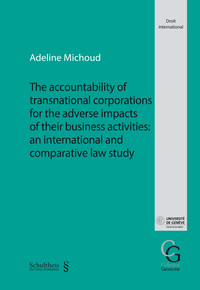autres publications Publications Responsabilité sociale des entreprises
Nouvel ouvrage : The accountability of transnational corporations for the adverse impacts of their business activities
Ivan Tchotourian 16 septembre 2020 Ivan Tchotourian
Mme Adeline Michoud vient de publier sa thèse chez Schulthess Verlag dans la collection Genevoise sous le titre : « The accountability of transnational corporations for the adverse impacts of their business activities: an international and comparative law study ». Nul doute que cet ouvrage intéressera nos lectrices et lecteurs du blogue !
Résumé :
In the last decades, transnational corporate activities have given rise to serious human rights abuses. In this doctoral thesis, the author provides an exhaustive account of the obstacles preventing the implementation of an effective corporate social responsibility system. The first chapter analyses the mechanisms developed in public international law to introduce corporate regulation. The second chapter explains the inadequacies of both American and European private international law systems to receive victims’ claims. Finally, the third chapter elaborates a comparative study of the different national law mechanisms to establish the responsibility of transnational corporations. The present book is addressed to all lawyers and more generally to all readers interested in the question of business and human rights.
À la prochaine…
normes de droit responsabilisation à l'échelle internationale Structures juridiques
L’art de jouer avec le droit : où est la RSE ?
Ivan Tchotourian 23 septembre 2016
Très beau papier dans The Economist intitulé « The Dark Art ». Cet article revient sur la puissance des grandes entreprises qui leur permet de développer des stratégies favorisant leurs seuls intérêts au détriment de celui des États et des consommateurs (évasion fiscale, lobbying…)
Companies are by nature competitive. That is mostly to be welcomed, but sometimes their competitive instincts play out in less welcome ways as they engage in some of the darker arts of management. The two most obvious ones are to pay as little tax as is legally possible, and to lobby governments and a variety of other bodies to gain an advantage over rivals. To a greater or lesser extent all companies do this. The big difference is that the superstar companies, being good at everything they do, are also much better than the rest at practising these dark arts and taking them mainstream
Les moyens des grandes entreprises les conduisent à être bonnes dans beaucoup de domaines dont celui de jouer avec les règles juridiques ou de les orienter :
This raises three worries. The first is that they will keep getting better at them, applying the same creative excellence to rule-bending as they do to running their business in general. Second, superstars might use the combination of these and other skills to build up impregnable advantages, giving them growing monopoly power. Third, as their businesses become more mature, they may come to rely increasingly on those dark arts.
À la prochaine…
Ivan Tchotourian
